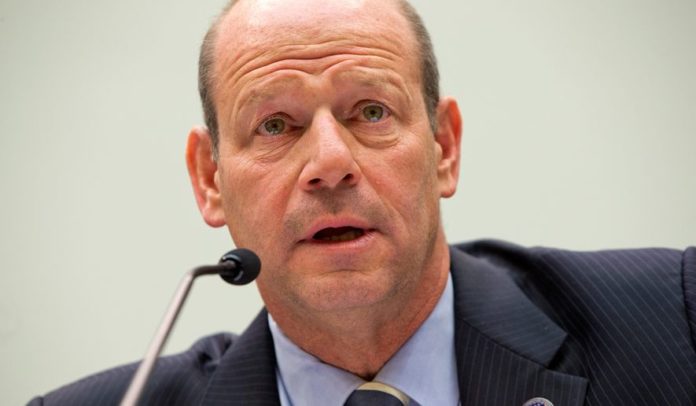
(Part 2)
Obviously, the Haitian economy is affected by natural disasters. While Trump’s defense team highlighted Haiti’s economic “progress” since the 2010 earthquake, Hurricane Matthew alone erased a third of the 2016 GDP, i.e. $ 2.8 billion.
It had a powerful impact on food security “which has remained a significant challenge for Haiti. Haiti depends on imports to meet more than 50 percent of its food needs, and is extremely vulnerable to fluctuations in global food prices. Chronic malnutrition impacts approximately half of Haiti’s population. In recent years, food and nutritional security in Haiti have gradually deteriorated due to the impact of Tropical Storm Isaac and Hurricane Sandy in 2012 and three consecutive years of severe drought (exacerbated by El Niño). Hurricane Matthew also exacerbated food insecurity in Haiti”.
It wasn’t Happel, nor Concannon, nor ourselves who report this, but the U.S. government itself in the Department of Homeland Security (DHS) Report of the Refugee, Asylum and International Operations (RAIO) dated October 2017 (page 11).
THE SITUATION IS NORMAL IN HAITI, BUT DO NOT GO!
In Part One of this series, we reported on the three massacres of 2017 and 2018 perpetrated by the police. The DHS’s RAIO report continues in the same vein. “Crime rates in Haiti are high, and the general security situation is ‘unpredictable.’ […] Violence against women is reportedly widespread, and has been characterized as a chronic or systemic problem. Impunity levels are high, and the capacity of Haiti’s police force is ‘relatively low.’ In general, Haitians ‘lack basic policing services,’ and criminals are reportedly able to operate without fear of the police. […] The Government of the United Kingdom has reported that ‘crime levels have continued to increase in 2017.’ In July 2017, the United Nations Secretary General reported that, since his previous report in March 2017, ‘growing tensions’ linked to socioeconomic grievances notwithstanding, key indicators, including crime and civil protests, remained within historically established statistical parameters.”
The State Department itself had sent warnings by diplomatic cable that it would be in the United States’ interest to renew TPS designations
More generally, “it is also clear that the Government has limited capacity to ensure a public administration system that can effectively guarantee the rule of law and a functioning justice system, promote the fight against corruption and effectively protect human rights.”
The State Department itself had sent warnings by diplomatic cable: it would be in the United States’ interest to renew TPS designations for El Salvador, Haiti, and Honduras and, specifically for Haiti, the repatriation of tens of thousands of TPS recipients would jeopardize the ability of the Haitian National Police (PNH) to guarantee security throughout the country.
While the defense argued during the trial that the withdrawal of the UN mission, MINUSTAH, meant that the situation was back to normal in the country, the State Department itself had issued a travel warning still in effect: “Reconsider travel to Haiti due to crimes and civil unrest.” Brian Concannon of the Institute for Justice and Democracy in Haiti (IJDH), reports that the embassy does not even let its staff travel to several regions of the country.
How could we then send back 59,000 TPS holders with their families to a country that cannot house them, provide health care for them, protect them? Not to mention educate them, guarantee employment for them, feed them!
In conclusion, yes, there has been progress, but the country has not yet recovered since the 2010 earthquake, and there are still extraordinary and temporary circumstances. The government’s RAIO is even more pessimistic, ending its report with these words: “Due to the conditions outlined in this report, Haiti’s recovery from the 2010 earthquake could be characterized as falling into what one non-governmental organization recently described as ‘the country’s tragic pattern of one step forward, two steps back’.”
In October 2017, the DHS and State Department pointed to the danger and Haiti’s state of severe crisis. Yet the following month, DHS Acting Secretary Elaine Duke ended TPS for Haiti and other countries. How did we get there?
VIOLATION OF THE OFFICIAL PROCEDURE
To answer this question, the plaintiffs called two heavy-weight witnesses: Michael Posner, former U.S. Assistant Secretary of State for Democracy, Human Rights, and Labor (DRL), a founding member and President of Human Rights First (formerly the Lawyers Committee for Human Rights), and currently professor and co-director of the Center of Business and Human Rights at NYU Stern School of Business; and Leon Rodriguez, lawyer and public servant since 1988, including director of DHS’s U.S. Customs and Immigration Service (USCIS) from 2014 to 2017.
Rodriguez described in detail the entire TPS process within the DHS. He called himself an expert on the issue, having been involved in about 15 recommendations to the DHS secretary in order for he/she to make a decision with full knowledge for a series of countries: re-designation, extension, termination. He recommended on one occasion a TPS extension for Haiti. In his position as USCIS director, he was also an advisor to the Secretary of DHS.
Three documents must be sent to the DHS Secretary: the USCIS Director’s recommendation with its basic rationale, but also the enumeration of negative factors so that the recipient is in possession of all relevant factors. Then the country conditions report, in its entirety, established by a research unit within RAIO, and thirdly the letter with the Secretary of State’s own recommendation. Being quite busy, the latter usually relies on the expertise of the USCIS.
When the judge asked whether there was any difference between Haiti’s conditions before and after the earthquake, Rodriguez replied that the recommendation is based on a combination of conditions existing at a given moment.
if you need a minimum of factors to renew TPS, it takes more to terminate TPS, since it is then a change of situation.
The defense’s general argument was that conditions have improved in Haiti – which is true, in relative terms since the earthquake – and that there has been sufficient progress to terminate TPS. Rodriguez pointed out that the current conditions do not necessarily have to be related to the 2010 earthquake. There may be new extraordinary and temporary conditions justifying TPS extension. But this is where the DHS’s new strict interpretation of TPS under Trump kicks in: TPS can be renewed only if “the conditions on which the initial designation of the country was based” continue to be present.
Another important point: if you need a minimum of factors to renew TPS, it takes more to terminate TPS, since it is then a change of situation.
Rodriguez, who thoroughly studied the case, said: “Facts have been ignored. I would not have recommended the termination of TPS for Haiti. But even if I had, I should have brought to the attention of the DHS secretary these important factors.” For example, absent from the recommendation of his successor at USCIS, Lee Cissna, was the cholera epidemic that has become endemic with seasonal spikes, the GDP slowdown to 1.4% in 2016, the percentage of Haitians below the poverty line (59% with $2.42 per day), and extreme poverty (more than 2.5 million), remittances to Haiti of $1.3 billion from the Haitians living in the United States, which represent nearly a third of Haiti’s GDP, according to World Bank estimates for 2016.
THE UNITED STATES IS NO LONGER AN IMMIGRANT NATION
Note that Cissna eliminated in February 2018, the phrase: “USCIS secures America‘s promise as a nation of immigrants.” This is ironic because he is himself the son of Peruvian immigrants. But that’s understandable when you know Cissna’s role in the family separation policy of Trump – for whom he was an election campaign volunteer – or pushing immigrants to turn down government aid for infant baby formula and food for schoolchildren for fear of torpedoing their adjustment of status, for receiving public support can now be a black mark and invalidate an application for a visa or residence.
He is also the one who launched investigations in June 2018 into “thousands of old records and fingerprint files to determine whether foreigners have made false or fraudulent statements in their attempts to obtain legal residence in the United States,” thus canceling their naturalization.
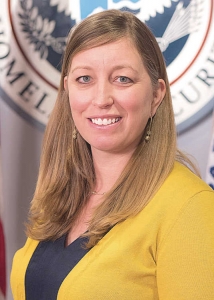
One would think that it was he who had asked for an investigation to see how many TPS holding Haitians were guilty of crimes of all kinds, but he was not yet director of USCIS at the time. Another anti-immigration fanatic was at the head of the USCIS Office of Policy and Strategy, former advisor to DHS Secretary John F. Kelly, Kathy Nuebel Kovarik. She was appointed on Sun., Apr. 2, 2017, and the next day, Monday, the slogan “Reinforce the U.S. workforce” about the H-1B visa (which allows U.S. companies to employ foreigners) had disappeared from the DHS site to match Trump’s brand-new policy: “Buy American and hire American.”
Chuck Grassley, 85, Iowa’s veteran Republican Senator, anti-abortion, pro-arms, anti-inheritance tax, Obama’s health plan critic, pro-NAFTA, then chair of the Senate Judiciary Committee, had already announced the Kovarik’s arrival on Mar. 19, 2017 by tweeting to
Trump: “If u want a real expert on fixing H1B a former staffer of mine just moved to Homeland Security. Call my office I will tell WHO SHE IS.” Six minutes later he added: “In other words I’ve been waiting for six yrs for a president interested in fixing H1B and that person has finally arrived.”
Restricting the H1B visa was not the only thing that interested these anti-immigration fanatics. Five days after her arrival, Kovarik hastened to ask her staff, “before the end of the day if possible” (in bold in the memorandum), to determine the number of Haitian TPS criminals, those receiving public or private assistance, the number of times they traveled to Haiti, and the amount of remittances to Haiti. As disclosed in internal memos obtained through the Freedom Of Information Act (FOIA, the law requiring the administration to provide official documents at the request of the public), she had to send these data to her chief, John Kelly.
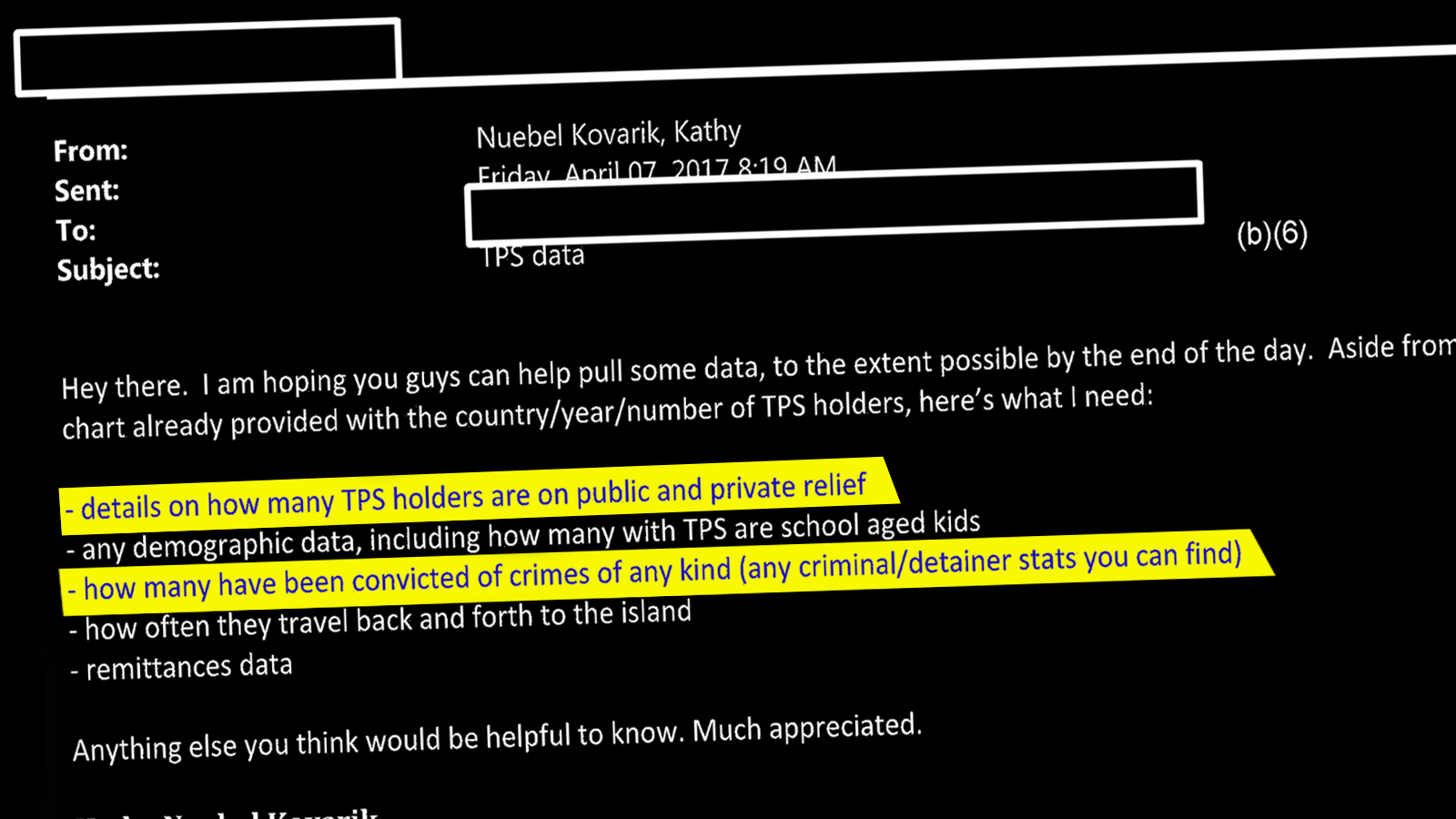
Several officials were demoralized by these changes, particularly those of RAIO who wrote the basis of the report on Haiti. It’s not just about politics. According to Rodriguez, in the case of the TPS there was “a fairly serious misinterpretation of the laws.” As we will see below, illegality and political pressure are clearly evident in the memoranda exchanged on TPS between DHS actors, obtained through FOIA, but many of which have been heavily redacted.
DEPARTMENT OF STATE: PROFESSIONALS UNDERMINED BY POLITICS
Posner, the former Assistant Secretary of State, in turn detailed for the court the structure and functioning of the State Department. For the conditions in each country (some 190) they rely entirely on their embassy, which is the “eyes and ears” of the United States in the field. It is the embassy that “drives the process.” As for the State Department, it is a “fact-based institution.”
“You can make your own policy, but you don’t ignore the facts,” Posner said.
For example, in one TPS memorandum, the regional bureau used some of the facts reported by the embassy, but ignores core elements. “It’s highly unusual,” Posner said. There are two narratives in the same document. In the third paragraph, it talks about the “lingering effects of the earthquake and the enormous challenges still present,” but in the following paragraph it says that “the conditions are now sufficient for the return of the TPS.”
Even Cissna had noticed such schizophrenia in the case of Sudan’s TPS from last August when he was still only Director of Immigration Policy at the USCIS Office of Policy. He sent an email: “The memo reads like one person who strongly supports extending TPS for Sudan wrote everything up to the recommendation section and then someone who opposes extension snuck up behind the first guy, clubbed him over the head, pushed his senseless body of out of the way, and finished the memo. Am I missing something?”
In the case of Haiti, we now know that Stephen Miller, the White House’s leading anti-immigration policy advisor, called the DHS Chief of Staff, Chad Wolf, and the senior State Department advisers, telling them to end its TPS. In turn, Secretary of State Rex Tillerson contacted Elaine Duke to tell her that ending TPS “was just something she had to do.” To drive his point home, John Kelly, who had become White House chief of staff, called Duke for a meeting with Attorney General Jeff Sessions and Stephen Miller …
“The State Department has abandoned the normal way of doing things,” Posner concluded. John Feeley, a career American diplomat and expert in Latin America who resigned as U.S. ambassador to Panama in March 2018, said the TPS decision “was precisely the kind of disregard for professional nonpolitical advice that we saw under Tillerson.”

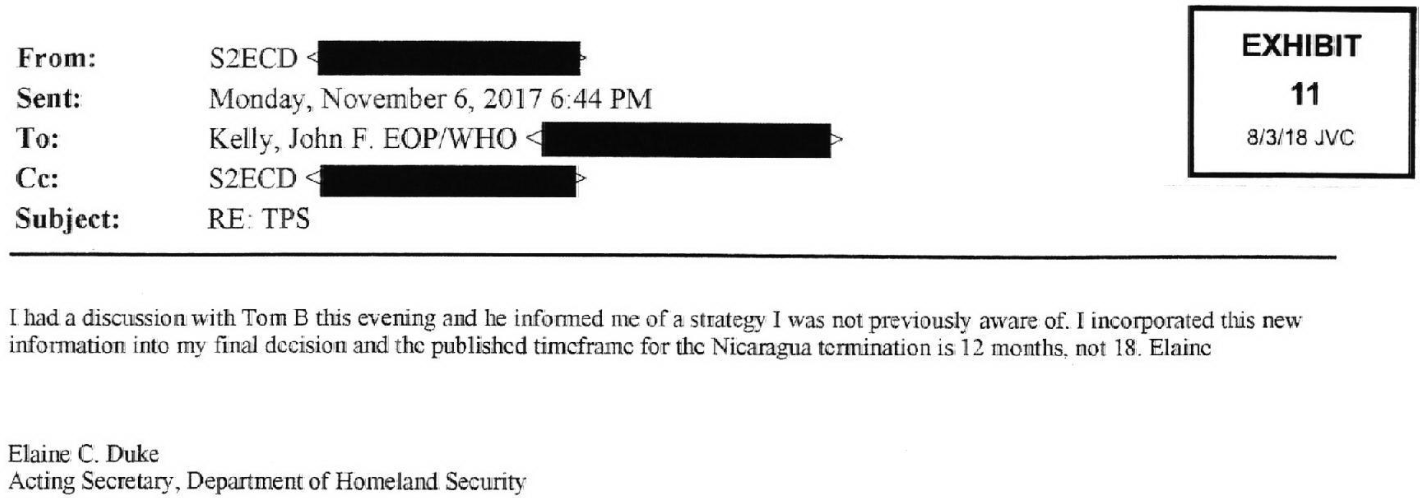
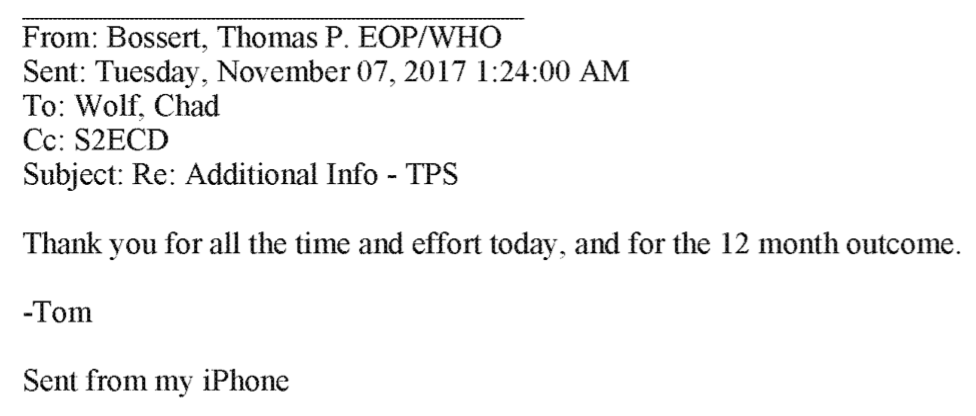 To comply with the White House’s diktat, Duke had to have her arm twisted as well as those of her staff. On Oct. 13, 2017, a few weeks before the decision to terminate Haiti’s TPS, and just before a meeting between USCIS Director Lee Cissna and DHS Secretary Elaine Duke, Kovarik discovered in three memos re “country conditions and analysis on the available options” for Haiti, El Salvador, and Nicaragua a “problem”, i.e. “that it reads as though we’d recommended an extension b/c we talk so much about how bad it is, but there’s not enough in there about positive steps that have been taken since its [TPS] designation.”
To comply with the White House’s diktat, Duke had to have her arm twisted as well as those of her staff. On Oct. 13, 2017, a few weeks before the decision to terminate Haiti’s TPS, and just before a meeting between USCIS Director Lee Cissna and DHS Secretary Elaine Duke, Kovarik discovered in three memos re “country conditions and analysis on the available options” for Haiti, El Salvador, and Nicaragua a “problem”, i.e. “that it reads as though we’d recommended an extension b/c we talk so much about how bad it is, but there’s not enough in there about positive steps that have been taken since its [TPS] designation.”
Brandon Prelogar, director of human rights at USCIS and former RAIO policy advisor, quickly responded to her urgent appeal: “We can comb through the country conditions to try to see what else there might be, but the basic problem is that it IS really bad there wrt [with respect to] all of the standard metrics. Our strongest argument for termination, we thought, is just that it is not bad in a way clearly linked to the initial disaster prompting the designations. We can work with RU [Research Unit] to try to get more, and/or comb through the country conditions we have again looking for positive gems, but the conditions are what they are.”
NOVEMBER 2017: FATEFUL MONTH FOR TPS
The decision in all three TPS cases was nevertheless termination. With respect to the Hondurans Duke wanted to resist and act “like a real human being,” according to her colleagues, and she gave them a six month extension. Kelly called her from Asia, where he was traveling with Trump & Co from Nov. 3 to 14, 2017, “to express his frustration.”
In the case of Nicaragua’s TPS, we have other government memoranda that also show the White House’s diktat, and which were revealed in another TPS trial against the Trump administration in the San Francisco, CA federal court. On Nov. 6, 2017 at 3:23 pm, a few hours before the deadline for the decision on the TPS, Duke sent an email to Kelly, announcing that she was giving the 5,000 Nicaraguans in the United States since 1999, 18 months to prepare to leave: “That will allow time for the affected persons and families to find other paths to stay in the United States or return to Nicaragua.” Three hours later she sent another email to Kelly saying that she had reduced the deadline to 12 months because in the meantime she had received a call from the White House advisor for internal security, Tom Bossert, who had made her change her mind. At the end Bossert replied: “Thank you for all the time and effort today, and for the 12 month outcome.”
Elaine Duke had received many honors during her career, including the Presidential Meritorious Rank Award, the DHS Secretary’s Medal, the TSA Silver Medal for Customer Service, the Department of the Army Commander’s Award for Public Service, and the Coast Guard’s Distinguished Public Service Medal. Specializing in management, she had sworn at her appointment to DHS in April 2017: “If confirmed [by the Senate], I promise to lead DHS in enforcing the law with respect and integrity. I will be honest in my assessments and recommendations, and relentless in pursuing excellence. Such commitments are critical at this juncture in homeland security”. In February 2018, three months after “her” decision to terminate TPS for Haiti and others, Elaine Duke officially announced her resignation at the age of 59, after 30 years in government but barely a year at DHS.
At the same time, also resigning was James Nealon, assistant secretary for international engagements in the DHS Office of Strategy, Policy & Plans, a former U.S. ambassador to Honduras, from whom Duke had desperately sought advice on TPS. Nealon was in favor of the extension and had sent, along with his colleagues in El Salvador, Nicaragua, and Haiti, cables warning that Honduras was not in a position to take back tens of thousands of deported TPS holders and their children born in the United States, who could be the target of attacks or recruitment by the powerful gangs of the country.
(To be continued)









